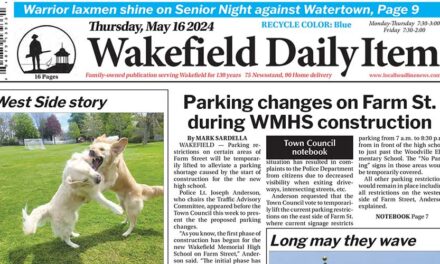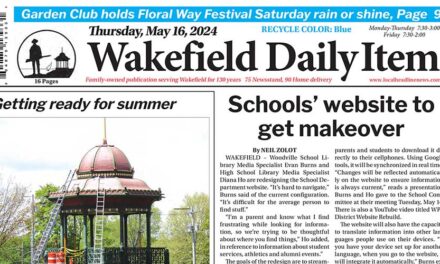By MARK SARDELLA
WAKEFIELD — The town’s very brief train horn era is about to come to an end.
After a huge outcry from citizens complaining about the ‘round the clock horn noise, the Town Council last night reversed its previous vote to allow the Broadway rail crossing to open with train horns sounding. The crossing will go back to being closed until the full Quiet Zone process with the Federal Railroad Administration plays out over the next 5-6 weeks.
Participating via Zoom, Lou Frangella, the Federal Railroad Administration’s Grade Crossing Specialist for the region, said that he would notify the MBTA today that the crossing is once again closed and trains should stop sounding their horns at every crossing. He said that it would take a few days for the MBTA to get the word out and the horns to stop.
Last night’s session began with a review from Town Engineer William Renault of the nearly full year that the Broadway crossing was kept closed in order for the town to keep its Quiet Zone.
A quiet zone is a kind of trade-off where sufficient safety measures must be in place so that it is not necessary for trains to sound their horns as a warning when approaching road crossings.
Renault explained once again that the Broadway crossing was closed last year to allow National Grid and the town to do some needed infrastructure work. But when the work was done and the town sought approval from the Federal Railroad Administration to re-open the crossing, they learned that the FRA had deemed that the town was not in sufficient compliance with safety measures at its railroad crossings to maintain its “Quiet Zone” status.
Since last November, the only way for the town to remain under the threshold and keep its Quiet Zone status has been to keep the Broadway crossing closed.
Over the ensuing months, Renault had been submitting proposal after proposal to the FRA for supplemental safety measures at various railroad crossings in town in an effort to get sufficient safety credits to allow the Broadway crossing to be re-opened. It has been a frustrating back and forth exercise as neighbors and residents have become increasingly impatient with the seeming lack of progress.
Two weeks ago, in response to a growing chorus of residents demanding that the crossing be re-opened, the Town Council voted to accept a temporary compromise whereby the crossing would be opened but trains would sound their horns for a period of weeks until the conclusion of the FRA process, which will allow the town to keep its Quiet Zone and open the Broadway crossing.
Last night, the Town Council delayed public participation until after Renault provided his summary and update on the process. Several residents spoke against the decision resulting in the train horns sounding.
Andrew McCarthy of Spring Street said that he did not see a lot of logic in the decision to re-open Broadway with trains sounding at every crossing in town since full approval of the town’s Quiet Zone was just weeks away.
Kara Cohen of Plymouth Road said that the whole situation with the Broadway crossing has focused neighbors’ attention on what might be done to increase safety on Broadway once it is fully reopened.
Andy Foss of Richardson Avenue said that his family hears the horns at every crossing from Broadway to Prospect Street. He was skeptical of the stated 5–6-week time-frame to get final FRA approval for opening Broadway with the Quiet Zone in place.
John Kitowicz of Meriam Street said that the train runs directly behind his house. He said that his family is awakened several times a night by the train horns. He implored the Town Council to do what it could to stop the horns.
Robin Milinazzo of Myrtle Avenue listed the times that the horns sound throughout the day and night. She said that having sleep disturbed so many times a night makes it impossible to function during the day. She called the decision to allow the horns “detrimental to public health.”
Lou Frangella of the FRA said that the FRA’s Quiet Zone approval process is nothing that he or Town Engineer Renault has any control over.
He said that the FRA could have terminated the town’s Quiet Zone when it was determined last year that the town was not in full compliance. Had that happened, he said, it could have meant three years of train horns before regaining Quiet Zone status.
As of now, he estimated that it would take two to three weeks to get the necessary signatures from the FRA and then another 21 days to before the crossing could be opened without train horns.
In response to a question for Town Councilor Ann Santos, Frangella confirmed that the train horns may indeed be louder now than they have been in the past.
Councilor Edward Dombroski said that when the Town Council voted two weeks ago to reopen the crossing with horns, that seemed like a reasonable compromise.
But he said that the noise was “not what I expected. People need to be able to sleep.”
Dombroski made a motion to re-close the Broadway crossing so that the trains would stop sounding their horns.
Santos said that she supported Dombroski’s motion, but stressed that her vote was not affected by the borderline threatening messages she has been receiving from residents.
“The horns are louder than I thought they were,” she said.
The Town Council vote to re-close Broadway and stop the train horns was unanimous.




